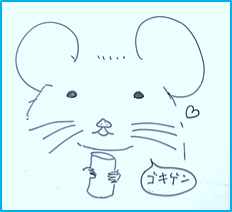TSUKUBA FUTURE
#097 Fascinated by the Behavior of Mice
Assistant Professor TAKAHASHI Aki, Faculty of Human Sciences

Aggressive behavior in animals can be classified as offensive behavior, fighting for territory or mates against others of their own species, or defensive behavior, against enemies of other species. All of these behaviors are logical ways of ensuring individual survival from the perspectives of ecology and behavioral science. However, how these behaviors started and how they are regulated are interesting questions from a physiological and psychological perspective. Prof. Takahashi is studying aggressive behavior in mice from a neurophysiological perspective.

Though mice are timid animals, two males put in the same cage will start to fight. They fight to determine dominance, and stop fighting once the weaker one assumes a submissive pose. This is because animals usually have a mechanism that suppresses aggressive behavior against other members of the same species. However, this mechanism sometimes does not work on aggression triggered by fear or other such causes. The reason for this is that neurophysiological mechanisms of suppression differ depending on the purpose of the aggressive behavior.
Prof. Takahashi began her career researching anxious behavior in mice. When placed in an unfamiliar environment, mice exhibit extremely anxious behavior. However, when a second male mouse is placed in the same cage with a male mouse exhibiting anxious behavior, the first mouse suddenly switches to aggressive behavior. Observing this phenomenon is what got Prof. Takahashi interested in studying aggressive behavior. A neurotransmitter called serotonin is known to be deeply involved in aggressive behavior. Not only mice but also humans exhibit excessive aggressive behavior when they have low levels of serotonin, but it was previously not known how the level of aggressive behavior is regulated in the brain.
Prof. Takahashi and her research team worked to solve this mystery and found that mice exhibit excessive aggressive behavior when inflow of the excitatory neurotransmitter glutamine increases in an area of the midbrain that contains serotonin neurons. When mice began exhibiting excessive aggressive behavior, there was also an increase in the amount of serotonin released. They also found that release of serotonin does not change when mice are exhibiting an appropriate level of aggressive behavior. This result was the exact opposite of what had been found in previous studies of the relationship between serotonin and aggressive behavior. It was caused by an increase in serotonin neuron activity at times of excessive aggressive behavior. This demonstrated that the basal level of serotonin and phasic change of serotonin release plays different roles on aggressive behavior.
Individuals subjected to aggressive behavior also experience excessive psychological stress. Male mice subjected to aggression from a larger, dominant male on nearly a daily basis with their cages placed next to each other experience what is called "social defeat stress". This causes them to lose weight and become less social, and exhibit symptoms that resemble depression. Antidepressants prescribed to humans work on these symptoms. However, no research had been conducted to determine whether social defeat stress differs between male and female mice. This is because male mice typically do not show aggression to female mice, and female mice do not fight with each other, either. The only time a female mouse shows aggressive behavior is if a male tries to attack her pup.
When she was hired as an international tenure-track Assistant Professor, which gave her the opportunity to do research abroad, Prof. Takahashi worked at Rockefeller University and Icahn School of Medicine at Mount Sinai in the United States, where she also conducted research on stress in female model mice. By using drugs to activate a particular part of the male mouse brain, she and her colleagues successfully made male mice exhibit aggressive behavior toward female mice, and found individual variation in the responses of female mice subjected to 10 days of aggressive behavior from males. About half of the female mice lost a large amount of weight after experiencing stress, and even began avoiding other males. The other half did not lose weight and showed no changes in social behavior. However, all of the female mice showed an increase in anxiety-related behavior.
The study of aggressive behavior is apparently a minor field in behavioral research in mice. The major fields are ones of great social interest, such as aging and Alzheimer's disease. However, many women suffer from anxiety disorders caused by aggressive behavior such as domestic violence or workplace harassment, and the incidence of conditions such as depression and anxiety disorders is also known to generally be higher in women than in men. Some studies have even shown differences in biological mechanisms of psychiatric disorders between sexes. There is also a growing body of evidence that depression and stress even affect a person's immune response. This is why advances in research in mouse models could be so promising. Of course, it is not appropriate to draw conclusions about human behavior directly from mouse behavior, and ethical considerations are also essential when conducting research in animals. Nevertheless, the study of aggressive behavior, for example, the finding that the so-called "happy hormone" serotonin increases aggressive behavior, is quite interesting. Prof. Takahashi wants to use her position as a female researcher to her advantage to tackle this challenging research.

Talking about how finding different lineages of mice while at the National Institute of Genetics was the starting point for her research

A snapshot from one of the laboratories she worked at in the United States
Article by Science Communicator at the Office of Public Relations


